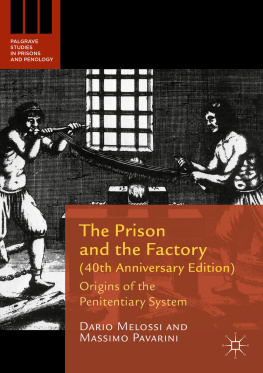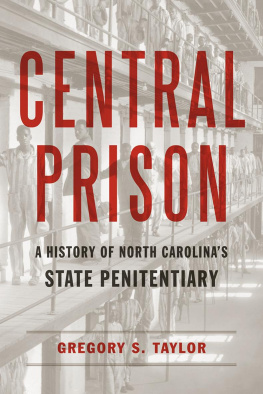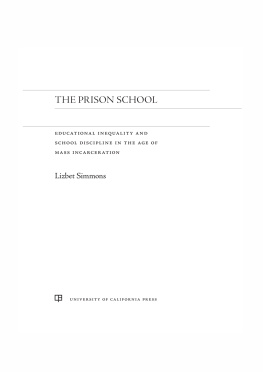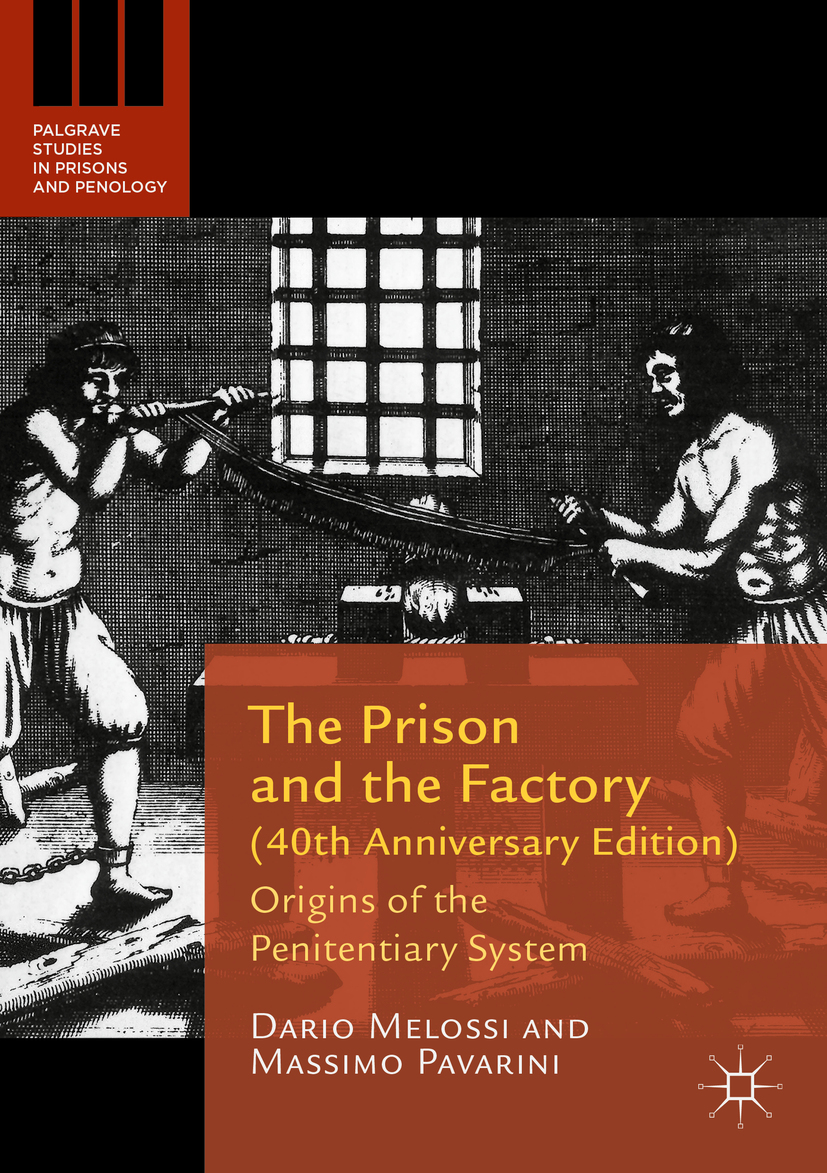Palgrave Studies in Prisons and Penology
Series Editors
Ben Crewe
Institute of Criminology, University of Cambridge, Cambridge, UK
Yvonne Jewkes
School of Applied Social Science, University of Brighton, Brighton, UK
Thomas Ugelvik
Criminology and Sociology of Law, Faculty of Law, University of Oslo, Oslo, Norway
This is a unique and innovative series, the first of its kind dedicated entirely to prison scholarship. At a historical point in which the prison population has reached an all-time high, the series seeks to analyse the form, nature and consequences of incarceration and related forms of punishment. Palgrave Studies in Prisons and Penology provides an important forum for burgeoning prison research across the world. Series Advisory Board: Anna Eriksson (Monash University), Andrew M. Jefferson (DIGNITY - Danish Institute Against Torture), Shadd Maruna (Rutgers University), Jonathon Simon (Berkeley Law, University of California) and Michael Welch (Rutgers University).
More information about this series at http://www.palgrave.com/gp/series/14596
Dario Melossi and Massimo Pavarini
The Prison and the Factory (40 th Anniversary Edition) Origins of the Penitentiary System
Dario Melossi
University of Bologna, Bologna, Italy
Massimo Pavarini
University of Bologna, Bologna, Italy
Palgrave Studies in Prisons and Penology
ISBN 978-1-137-56589-1 e-ISBN 978-1-137-56590-7
https://doi.org/10.1057/978-1-137-56590-7
Library of Congress Control Number: 2017954182
The author(s) has/have asserted their right(s) to be identified as the author(s) of this work in accordance with the Copyright, Designs and Patents Act 1988.
The Editor(s) (if applicable) and The Author(s) 2018
This work is subject to copyright. All rights are solely and exclusively licensed by the Publisher, whether the whole or part of the material is concerned, specifically the rights of translation, reprinting, reuse of illustrations, recitation, broadcasting, reproduction on microfilms or in any other physical way, and transmission or information storage and retrieval, electronic adaptation, computer software, or by similar or dissimilar methodology now known or hereafter developed.
The use of general descriptive names, registered names, trademarks, service marks, etc. in this publication does not imply, even in the absence of a specific statement, that such names are exempt from the relevant protective laws and regulations and therefore free for general use.
The publisher, the authors and the editors are safe to assume that the advice and information in this book are believed to be true and accurate at the date of publication. Neither the publisher nor the authors or the editors give a warranty, express or implied, with respect to the material contained herein or for any errors or omissions that may have been made. The publisher remains neutral with regard to jurisdictional claims in published maps and institutional affiliations.
Cover illustration: The cover illustration shows a team of raspers at work in the Amsterdam Rasphuys in the late sixteenth century
Printed on acid-free paper
This Palgrave Macmillan imprint is published by Springer Nature
The registered company is Macmillan Publishers Ltd.
The registered company address is: The Campus, 4 Crinan Street, London, N1 9XW, United Kingdom
IN MEMORY OF MASSIMO PAVARINI (19472015)
Preface (2017): Melossi and Pavarinis The Prison and the Factory
Today the study of punishment and society, global patterns and genealogies of penal practices is one of the most lively subfields in the social sciences and humanities, generating scores of articles, edited volumes and monographs every year. Little wonder, you might say, the great pillars of social theoryEmile Durkheim, Max Weber and Karl Marxhad offered important analyses of the role of penal practices in modern society, making it one of the best examples of the modernisation process and its discontents. Moreover, the emergence of mass incarceration in the USA during the last decades of the twentieth century, and the punitive turn underway in many recently industrialised societies around the globe has made it obvious that forms of punitive exclusion are core features of power and social order.
It is true that Durkheim and Weber made important analyses of penal practices (especially Durkheim) and that Marxist social theorists of the twentieth century, particularly Frankfurt School member Georg Rusche explored the role of penality in the regulation of the capitalist economic system. And yet, the field of punishment and society today is not really an extension or a synthesis of any of these classical social theories. Moreover, the crucial works that launched this subfield began a decade before anyone observed mass incarceration and indeed in quite different conjunctural circumstances.
It is, in fact, in the late 1970s and very early 1980s that the intellectual elements of contemporary punishment and society research emerge. Two books, researched in the mid-1970s and published in their original languages in 1975 and 1977 by authors working completely independently, brought classical social theory on punishment into striking dialog with critical observations on the central struggles over penal power going on at the time. The first, Michel Foucaults Discipline and Punishment: the Birth of the Prison (published in English in 1977), remains among the best known books on punishment and in contemporary critical analysis generally. The second, The Prison and the Factory: Origins of the Penitentiary System (published in English in 1981) remains largely unknown outside radical criminology and punishment and society studies and read by too few even in those fields today. That is misfortune that this timely new edition can remedy. For not only are all the crucial innovations in the analysis of penal practices attributed to Foucault brilliantly at work in The Prison and the Factory , they are presented without the often dazzling but frequently confounding efforts of Foucault to lay the foundations of his uncompleted project for a genealogy of the modern soul (as he put it). Melossi and Pavarinis study of the political-economic context of the invention of the penitentiary is the proper starting point for the study of punishment and society.
Remarkably both books developed an approach to examining the social work of punishment that built on, while revising considerably, the classic social theorists, especially Durkheim and Marx, who had given punishment more or less prominent roles in largely structuralist theories of social practices. Rather than focus on the function of punishment (whether expressing social solidarity or directing coercive power in the interest of elite control), both studies offered a way of treating punishment as part of a larger political technology of the body, to use Foucaults productive metaphor. For both books this meant tracing the transformation in the penal field to developments in the availability of various schemas for coordinating and controlling assembled groups of people. Both studies placed political economy and the forms of inequality and conflict necessitated by economic production at the start of their analysis, but then look beyond traditional linkages between economic base and legal and political superstructure to trace the effects of penal mechanisms on subjects and their bodies. Important changes in political-economic structure can force dramatic changes in penal forms, but rarely direct an alternative.











